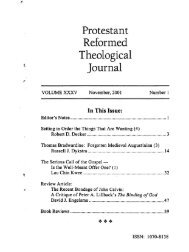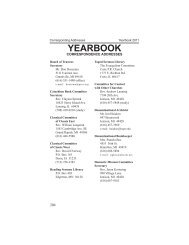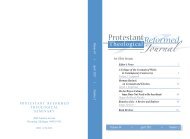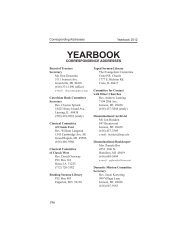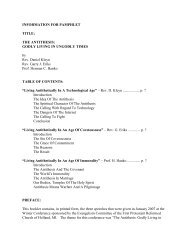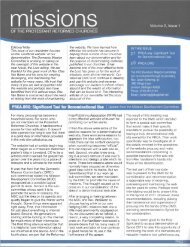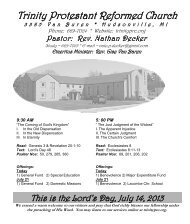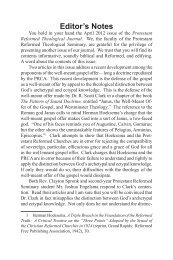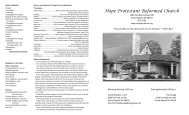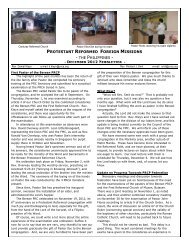November 2007 - Protestant Reformed Churches in America
November 2007 - Protestant Reformed Churches in America
November 2007 - Protestant Reformed Churches in America
Create successful ePaper yourself
Turn your PDF publications into a flip-book with our unique Google optimized e-Paper software.
<strong>Protestant</strong> <strong>Reformed</strong> Theological Journal<br />
He<strong>in</strong>rich Bull<strong>in</strong>ger and the Doctr<strong>in</strong>e<br />
of Predest<strong>in</strong>ation: Author of<br />
“the Other <strong>Reformed</strong> Tradition”<br />
Cornelis P. Venema. Grand Rapids,<br />
MI. Baker Academic, 2002.<br />
137 pages. $22.00 (paper). ISBN#<br />
0-8010-2605-9. [Reviewed by<br />
Prof. Russell Dykstra.]<br />
He<strong>in</strong>rich Bull<strong>in</strong>ger and the<br />
Doctr<strong>in</strong>e of Predest<strong>in</strong>ation is<br />
another <strong>in</strong> the series of books<br />
published by Baker entitled<br />
“Texts and Studies <strong>in</strong> Reformation<br />
and Post-Reformation<br />
Thought.” The goal of the<br />
project is to make available significant<br />
manuscripts of the Reformation<br />
such as Caspar<br />
Olevianus’ Firm Foundation<br />
(already published) and<br />
Theodore Beza’s Table of Predest<strong>in</strong>ation<br />
(still com<strong>in</strong>g), as<br />
well as studies of Reformation<br />
and Post-Reformation topics. It<br />
is a worthy goal.<br />
This volume purposes to set<br />
forth He<strong>in</strong>rich Bull<strong>in</strong>ger’s<br />
teach<strong>in</strong>g on predest<strong>in</strong>ation, especially<br />
to answer the question<br />
whether Bull<strong>in</strong>ger’s teach<strong>in</strong>g<br />
marked a radical divergence<br />
from the rest of the <strong>Reformed</strong><br />
tradition. Dr. Cornelis Venema<br />
expla<strong>in</strong>s the issue (p. 12):<br />
122<br />
J. Wayne Baker and others<br />
have argued that, contrary to<br />
the emphasis upon sovereign<br />
and unconditional predest<strong>in</strong>ation<br />
<strong>in</strong> the <strong>Reformed</strong> tradition<br />
stemm<strong>in</strong>g from John Calv<strong>in</strong>,<br />
the Rh<strong>in</strong>eland Reformers, beg<strong>in</strong>n<strong>in</strong>g<br />
with Zw<strong>in</strong>gli and <strong>in</strong>clud<strong>in</strong>g<br />
Bull<strong>in</strong>ger, authored<br />
another <strong>Reformed</strong> tradition.<br />
This tradition’s primary emphasis<br />
was upon a conditional<br />
covenant doctr<strong>in</strong>e. Bull<strong>in</strong>ger,<br />
it is argued, was the author of<br />
a <strong>Reformed</strong> tradition that repudiated<br />
the double predest<strong>in</strong>arianism<br />
of Calv<strong>in</strong> and advocated<br />
<strong>in</strong>stead a s<strong>in</strong>gle or<br />
conditional predest<strong>in</strong>arianism.<br />
Whereas Calv<strong>in</strong> and<br />
Geneva followed the tradition<br />
of predest<strong>in</strong>arian doctr<strong>in</strong>e<br />
stemm<strong>in</strong>g from August<strong>in</strong>e,<br />
Bull<strong>in</strong>ger and Zurich were responsible<br />
for a quite different<br />
formulation of the doctr<strong>in</strong>e of<br />
grace, one which by means of<br />
its covenant view lends more<br />
weight to the realization of<br />
God’s purposes <strong>in</strong> history.<br />
These dist<strong>in</strong>ct doctr<strong>in</strong>al positions<br />
of Calv<strong>in</strong> and Bull<strong>in</strong>ger<br />
constitute the historical background<br />
to a divergence with<strong>in</strong><br />
subsequent <strong>Reformed</strong> theology<br />
between unconditional<br />
predest<strong>in</strong>arianism and conditional<br />
covenantalism. The tra-<br />
Vol. 41, No. 1



